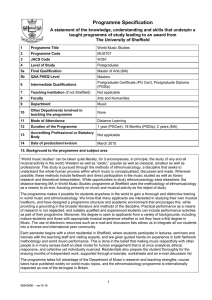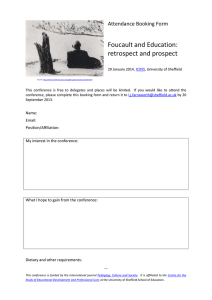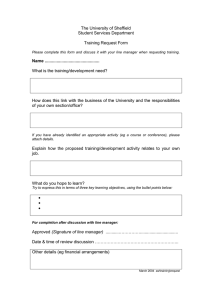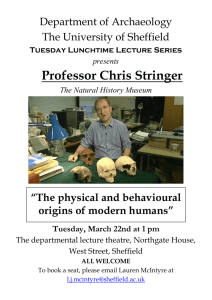Programme Specification
advertisement
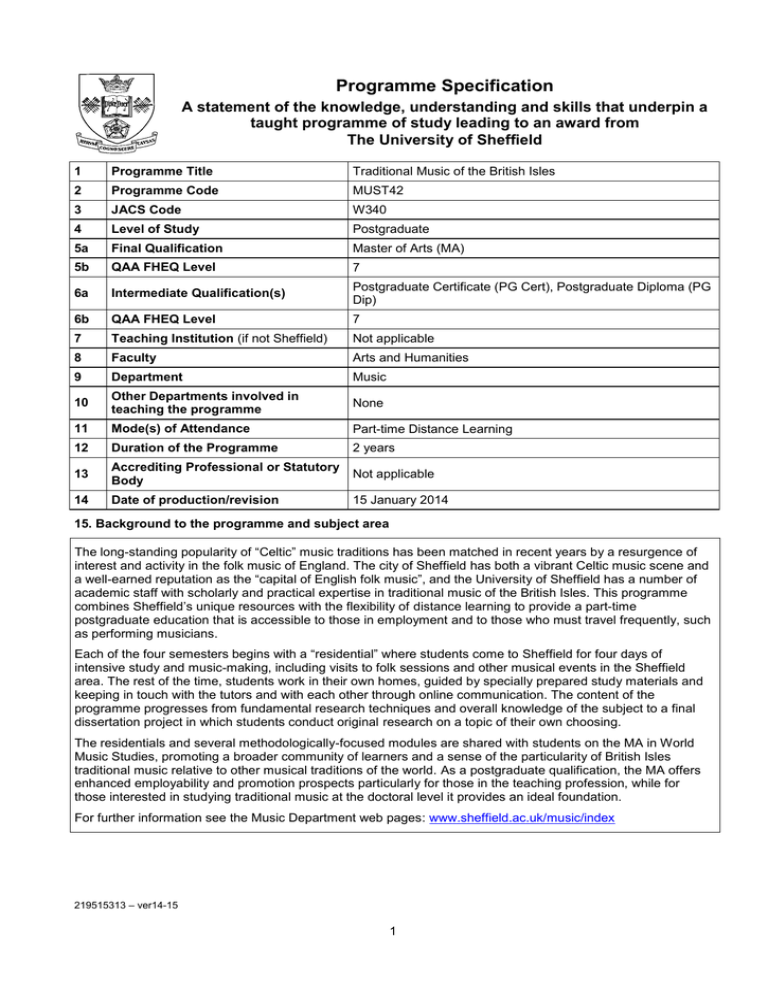
Programme Specification A statement of the knowledge, understanding and skills that underpin a taught programme of study leading to an award from The University of Sheffield 1 Programme Title Traditional Music of the British Isles 2 Programme Code MUST42 3 JACS Code W340 4 Level of Study Postgraduate 5a Final Qualification Master of Arts (MA) 5b QAA FHEQ Level 7 6a Intermediate Qualification(s) Postgraduate Certificate (PG Cert), Postgraduate Diploma (PG Dip) 6b QAA FHEQ Level 7 7 Teaching Institution (if not Sheffield) Not applicable 8 Faculty Arts and Humanities 9 Department Music 10 Other Departments involved in teaching the programme None 11 Mode(s) of Attendance Part-time Distance Learning 12 Duration of the Programme 2 years 13 Accrediting Professional or Statutory Body Not applicable 14 Date of production/revision 15 January 2014 15. Background to the programme and subject area The long-standing popularity of “Celtic” music traditions has been matched in recent years by a resurgence of interest and activity in the folk music of England. The city of Sheffield has both a vibrant Celtic music scene and a well-earned reputation as the “capital of English folk music”, and the University of Sheffield has a number of academic staff with scholarly and practical expertise in traditional music of the British Isles. This programme combines Sheffield’s unique resources with the flexibility of distance learning to provide a part-time postgraduate education that is accessible to those in employment and to those who must travel frequently, such as performing musicians. Each of the four semesters begins with a “residential” where students come to Sheffield for four days of intensive study and music-making, including visits to folk sessions and other musical events in the Sheffield area. The rest of the time, students work in their own homes, guided by specially prepared study materials and keeping in touch with the tutors and with each other through online communication. The content of the programme progresses from fundamental research techniques and overall knowledge of the subject to a final dissertation project in which students conduct original research on a topic of their own choosing. The residentials and several methodologically-focused modules are shared with students on the MA in World Music Studies, promoting a broader community of learners and a sense of the particularity of British Isles traditional music relative to other musical traditions of the world. As a postgraduate qualification, the MA offers enhanced employability and promotion prospects particularly for those in the teaching profession, while for those interested in studying traditional music at the doctoral level it provides an ideal foundation. For further information see the Music Department web pages: www.sheffield.ac.uk/music/index 219515313 – ver14-15 1 16. Programme aims This programme aims: 1. To provide teaching that instils in students a thorough academic foundation in traditional music studies; 2. To equip students with direct experience of a range of research skills and techniques; 3. To prepare students for further research at doctoral level, and for employment in pertinent fields; 4. To engender in students broader life skills, including: an ability to engage independently in self-directed study; critical thought and argument exercised through speech and writing in a variety of media; teamwork and leadership skills; and an ability to understand and respect the views of others; 5. To make the Department’s research and teaching expertise in traditional music studies available to those whose circumstances prevent them from studying full-time. These aims are in line with the University of Sheffield’s aspirations as set out in the Learning and Teaching Strategy for 2011–2016, particularly points 2 (that Sheffield should be known for “Taught postgraduate programmes emphasising disciplinary depth, research training, and the development of professional competencies, delivered on both a full-time and part-time basis”) and 4 (“Distance and blended learning postgraduate taught programmes, generally delivered on a part-time basis for those with employment commitments”). 17. Programme learning outcomes Knowledge and understanding Students completing the PG Cert will: K1 Have developed a detailed knowledge of at least one musical tradition of the British Isles, and a general knowledge of others. K2 Understand how knowledge about traditional music is generated through specific research techniques and methodologies. K3 Be able to reflect critically on their experience of music and explore in practice notions about the role of music in culture. K4 Have a detailed and critical knowledge of selected key texts in the study of traditional music. In addition, students completing the PG Dip will: K5 Understand how knowledge of current traditional music practices is generated through ethnomusicological fieldwork. K6 Be aware of ethical and legal issues relating to music and live music research. K7 Have developed a more comprehensive and critical understanding of at least one specialised topic within the field of traditional music studies. In addition, students completing the MA will: K8 Have acquired, by completing a substantial piece of original research, a comprehensive understanding of relevant knowledge and applicable techniques which are at the forefront of traditional music studies. Skills and other attributes Students completing the PG Cert will: S1 Be able to demonstrate competence in using a range of research-related skills for the study of traditional music. S2 Be able to show independent thought and originality by formulating and investigating specific research questions on traditional music topics. 219515313 – ver14-15 2 S3 Be able to articulate original understandings of traditional music effectively in writing, supported where appropriate by other media. S4 Be able to comprehend and evaluate key texts in the study of traditional music with critical understanding and independence of thought. In addition, students completing the PG Dip will: S5 Have developed skills in conducting and documenting music research with live human participants in a manner reflecting current theory and practice in the field. S6 Have developed skills appropriate to the deeper study of at least one specialised topic within the field of traditional music studies (e.g. design of traditional music teaching materials; traditional music radio programme production). In addition, students completing the MA will: S7 Have developed an ability to discover new knowledge and/or understandings on specific topics at the forefront of the field of traditional music studies. S8 Have prepared themselves for further postgraduate research and employment by developing analytical and presentational skills at a level appropriate to doctoral study in music. 18. Teaching, learning and assessment Development of the learning outcomes is promoted through the following teaching and learning methods: Residential courses (4 x 4 days) begin each semester, providing students with the foundation and preparation that they need to work away from Sheffield for the rest of the semester. The residentials are used to deliver forms of teaching that work best in a face-to-face setting, including lectures, seminar discussions, tutorials, practical workshops and supervised fieldwork activities. For the rest of the year, study materials are made available electronically, including eoffprints for essential readings, and specially created worksheets and exercises are distributed online, often with guided discussions on a MOLE2 blog or discussion board. Where appropriate, students are also given access to the MOLE2 pages and other online resources for relevant onsite modules, and can participate in online discussion with onsite students as well. The focus of the residentials shifts as students progress through the programme, with earlier residentials emphasising knowledge and skills that are widely shared in traditional music studies (K1-4, S1-4) and later ones concentrating on the knowledge and skills needed for independent research and writing (K5-8, S5-8). 1. Lectures are employed primarily to develop subject-specific knowledge and musical materials (K1, K2, K7), with ethical concerns introduced also (K6). Skills covered here include practice in the skills and techniques of ethnomusicological research through classroom exercises (S1), use of technology (S5) and presentational matters (S3). 2. Seminars require students to reflect on material (K3, K4), to develop and apply analytical skills (S2, S4), to work toward particular goals (K7, S2) and to respond immediately to the thoughts and materials introduced by others (K2, K3, K4, S4). Some seminars include group work, for instance in mastering technological and fieldwork skills (K2, S5). 3. Practical workshops in which students have a first-hand experience of making music in various styles promote a more intimate knowledge of the music studied (K1), material for reflection on musical experience (K3) and an awareness of performance itself as a research technique (S1). 4. Supervised fieldwork activities provide guided practical experience in a key research strategy for the study of traditional music (S5) as well as developing direct awareness of the ethical and epistemological issues involved in music research with live human participants (K5, K6). 5. Tutorials, both face-to-face at the residentials and via e-tutorials at other times, play a vital role in the degree, ranging from discussion of subject-specific knowledge and skills informed by the latest research in ethnomusicology (K1, K4, K7, S1-4), to provision of the opportunity to reflect in a supportive environment on the 219515313 – ver14-15 3 student’s personal musical experience (K3). As with residentials, the focus of supervision shifts as students progress from mastering the essential knowledge and skills of the field (K1-4, S1-4) to carrying out and presenting their own original research (K8, S7-8). 6. E-mail discussion lists enable students to exchange ideas and information through a supportive peer community (K1-4, K7, S1, S4). 7. Independent study, a vital part of any distance learning programme, allows students to develop ideas of interest and relevance to their own musical experiences at a pace that suits their employment and personal circumstances (K1, K4, K7, K8, S2, S3, S7, S8). 8. Worksheets on assigned readings are provided to guide students during independent study and help them develop a comprehensive and critical understanding of the assigned texts (K4, K7, S4). Opportunities to demonstrate achievement of the learning outcomes are provided through the following assessment methods: 1. A supervised dissertation of 15,000 words (or a supervised folio of fieldwork materials, editions or analyses of equivalent size) is the largest single element of summative assessment, and successful completion is likely to require demonstration of learning outcomes across the whole range of K1-8 and S18, with particular emphasis on K7-8, S3 and S7, the balance of other outcomes depending on the topic and method selected. 2. Written assignments of between 1,000 and 5,000 words contribute towards the degree in several modules. These take various forms, including essay, transcription, bibliography, and review. Taken as a whole, these assignments will demonstrate knowledge and skills across the range K1-7 and S1-6, with the balance in any one module depending on the focus of the module and the topics selected for writing. In general, original essays demonstrate outcomes K1, K4, K7, S2 and S3; book and performance reviews highlight K2, K4, S3 and S6; transcriptions emphasise K1 and S2; and bibliographies stress K1 and S1. 3. Multimedia folios form a further assessed element in some modules where the written word in itself is not sufficient to assess the results of the work. Materials generated through fieldwork are submitted partly in recorded form, and students choosing practically-orientated options such as the production of teaching materials or radio programmes can submit their work in the most appropriate media. The nature of knowledge and skills demonstrated will vary according to the focus of the project but successful study will demonstrate primarily K5, K7, S1, S3, S5 and S6. The structure and relative weighting of modules as set out in the programme regulations will ensure that all students develop knowledge and skills across the list of learning outcomes. In order to cater for student-led specialisation in the latter part of the programme, there is some flexibility in the exact balance of assessed elements that will be demonstrated in the final assessment, a point that usefully reflects both individual student needs and the breadth of the subject area in question. 19. Reference points The learning outcomes have been developed to reflect the following points of reference: Confirmation of the appropriate QAA Framework level. The University Learning, Teaching and Assessment Strategy http://www.shef.ac.uk/lets/strategy/lts. Departmental Learning, Teaching and Assessment Strategies. The University’s plan for the future http://www.shef.ac.uk/strategicplan/mvi. Departmental research expertise and plans in the relevant subject area. Feedback from external examiners of the MA in World Music Studies and the MA in Ethnomusicology. 219515313 – ver14-15 4 20. Programme structure and regulations The MA in Traditional Music of the British Isles is delivered over two years of part-time study during which the student undertakes units to the value of 180 credits. In Year 1, Semester 1, Research Skills (MUS6002, 15 credits) provides a grounding in academic research and writing skills, use of library and web resources, and the software through which the distance learning programme is conducted. Traditional Music of the British Isles (MUS****, 30 credits) cultivates a broad acquaintance with British and Irish musical traditions and a deeper knowledge of at least one of them. In Year 1, Semester 2, Case Studies in Ethnomusicology (MUS6005, 15 credits) takes a close look at selected books by ethnomusicologists, including at least one devoted to a musical tradition of the British Isles. Students develop awareness of key issues in the field and an ability to respond critically to the writing of leading scholars. Students who have accumulated a total of 60 credits at this stage are eligible for the award of the Postgraduate Certificate if they do not progress further. Those continuing to complete the Postgraduate Diploma or MA concurrently take Approaches to Fieldwork (MUS6004, 30 credits), which prepares students for their own independent research through training in the skills of documenting a live musical tradition, including technical competence with sound and video recording equipment, interpersonal skills, and ethical considerations. Year 2, Semester 1 comprises the Special Topic in World Music (MUS6006, 30 credits), which provides an element of flexibility, allowing students to specialise in a subject area selected from various options offered. Among these will be at least one topic focused on traditional music of the British Isles. Other topics available in any given year will depend on the current research interests of staff, but topics might typically include Teaching World Music, Radio Programme Production, or Music of East Asia. Students who have accumulated a total of 120 credits at this stage are eligible for the award of the Postgraduate Diploma if they do not progress further. For students going on to complete the MA, the Special Topic module leads naturally toward the Dissertation (MUS****, 60 credits), formally supervised in Year 2, Semester 2 but optionally prepared or started earlier. The Dissertation, on a topic approved by the tutor within the area of traditional music of the British Isles, may be based on library or fieldwork research and may include original field or archive materials as appendices. Detailed information about the structure of programmes, regulations concerning assessment and progression and descriptions of individual modules are published in the University Calendar available on-line at http://www.shef.ac.uk/govern/calendar/regs.html. 21. Student development over the course of study The degree programme has been designed so that students move logically from an introduction to the study of traditional music and the research skills involved, through increasingly specialised, technical and critical studies, to the completion of an original research project that contributes new knowledge to the field. At every step, they are guided both by the module structure and materials, and by supervision in person (during the residentials) and via the Internet. On completion of the first semester, students will have broadened their musical horizons through exposure to a range of musical traditions and an in-depth look at one or more selected traditions. Meanwhile, they will have come to understand how knowledge of traditional music is generated through the research methods of ethnomusicology. In the second semester, they begin to assess the use of those methods by selected ethnomusicologists who have achieved some prominence in the field, and to apply some of these methods in their own practical experience of fieldwork. At this point, they will have a critical knowledge of ethnomusicology and experience in evaluating research on traditional music. Students who continue to complete the MA will then build on this knowledge to function as ethnomusicologists in their own right. Through the development of specialised interests and the formulation, planning, and completion of an original research project, each student will apply the skills of an ethnomusicologist to document and interpret a previously unstudied facet of traditional music, whether it be a particular local tradition, an individual musician or repertoire, or a theoretical issue. Each graduate of the programme will thus have acquired a unique combination of knowledge and abilities in the study of traditional music. 219515313 – ver14-15 5 22. Criteria for admission to the programme Applicants will normally hold a 2:1 degree (or equivalent) in a subject in one of the humanities or social sciences and a demonstrated record of musical experience as a performer (in any tradition) or exceptional interest and theoretical expertise as a musical listener. Mature students are encouraged to apply, and life and work experience is taken into consideration along with academic qualifications. The English language requirement is IELTS 6.5 with a minimum of 5.5 in each component. 23. Additional information Prospective students should be aware of certain costs associated with the course in addition to the tuition fees. Attendance at the four residentials is mandatory, and students will need to meet the cost of travel and accommodation. Information will be provided on competitively priced accommodation in Sheffield but the cost of this accommodation is not included in the fees. Students will also need to access relevant books either at a library near their home or by purchasing them (reduced prices are often available through internet book shops. They should also own, or have access to, certain basic equipment required for completing the coursework and fieldwork projects. This is includes a computer with music notation software, a sound recording device and a camera. Many students find that a video camera is also useful for fieldwork. For further information see the Music Department web pages: www.sheffield.ac.uk/music/index This specification represents a concise statement about the main features of the programme and should be considered alongside other sources of information provided by the teaching department(s) and the University. In addition to programme specific information, further information about studying at The University of Sheffield can be accessed via our Student Services web site at http://www.shef.ac.uk/ssid. 219515313 – ver14-15 6
